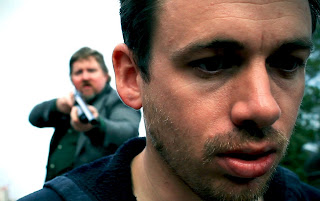
So you've established a history for your character to include where they've come from, what their experience is with others in the scene and even their history with props and the environment. You've taken what you could from the script and invented the rest based on personal choices. Now let's look at the PRESENT. Where are you now?
The first thing to keep in mind has to do with the performance. You've made choices and so have the other actors. Sometimes the intensity (or lack of) in another actor in a scene can completely morph your performance. Sometimes that's good. Sometimes it's very, very bad. In lower budget films the director may have cast cousin Bob to be opposite you in a scene and you really have to struggle to stay in the game. This is a tricky situation. If you talk to the other actor, they can take offense, but often times a little prodding may get the scene where it needs to be. The director may also be offended if you talk to them. The best advice I can give you is "BE POSITIVE". "You suck" or "They suck" isn't going to help the situation or anyone in it. Be constructive and at the very least, YOU be on. Your performance can give the energy needed to pull others up in their game.
I had a specific scene on "Humans Vs. Zombies" where Madison Burge pushed me in a direction I didn't expect to go in the scene. It rocked! Her unexpected fervor in her antagonizing of my character even changed the line I delivered in the scene. My original thought pattern was that my character had disappointed the others in the scene and I was going to be apologetic in my delivery. Her spark made me angry at these kids for being so unappreciative of what I had done RIGHT. Totally changed my scene and was a great moment for me as an actor. It works both ways.
Let's talk briefly about your breakdown of each scene in its present. In every scene, your character needs to have an objective. We all have moments in our lives when we don't have a particularly strong drive to do something. However, in a 90 minute film (and especially a 15 minute short) all those moments should be left off the screen. Every moment on camera needs to further the story. Therefore, everything must be interesting. So, in every scene YOU need to have something you want. What is your objective?
In my days at Missouri Southern learning stage theater and then reinforced in Larry Moss' excellent acting book "The Intent to Live" (see sidebar for a link to buy cheap on Amazon.com) I was indoctrinated into the use of objectives. Your objective should always be based on an action verb. Something you will motivate you physically as well as mentally. If you're playing a scene with two lovers that are fighting, one may have the objective to "Escape the other's torment" while the other may want to "Tower over and oppress their lover".
The most interesting scenes are ones where objectives clash. In the above description, if I want to escape and you want to tower over me, we are at odds. Maybe we both want to tear each other apart in an action sequence...or maybe just in a sparring of words. It's important to note here as well that breaking down the various types of conflict that man vs. nature and similar themes could put you at odds with the environment rather than a specific character. A hurricane could have an objective as well.
Also, you can be at odds with yourself. Recently I played a character in a scene where he was in the process of attempted suicide. His guilt over what he had done gave him the objective of "Punishing himself for his past deeds" while at the same time a fear of the hereafter and sense of survival gave him a counter-objective of "Fight to stay alive". In this scene, I had two objectives and was at odds with myself.
Rarely in film have I been given the opportunity to rehearse with the cast. That's usually called a first take! If you get the opportunity, take advantage of it. As a dayplayer, the opportunity will rarely ever present itself and bugging a director and other actors about your objective and what you think the scene should be can be disaster for your chances of ever coming back. Be cautious when sharing your vision.
It's also very important when working in a scene to be mindful of WHERE you are. What time period, what location, what's just happened (the immediate past), and who you are with are very important to the scene. In the age of green screen you may have to fake EVERYTHING. You also may be shooting scenes out of sequence (actually guaranteed most of the time) as the producers try to exhaust a location or actor before moving on to another scene. You must be mindful of the present in which your character exists.
No comments:
Post a Comment